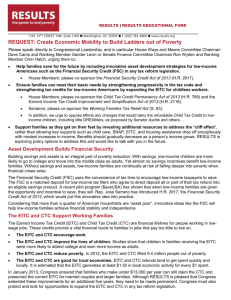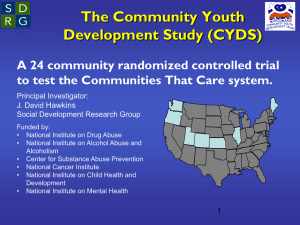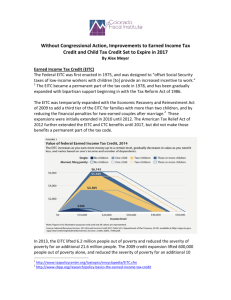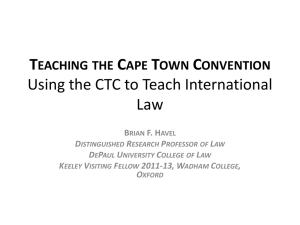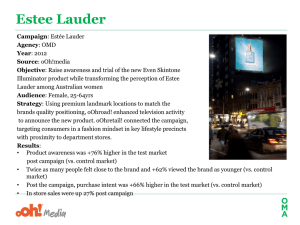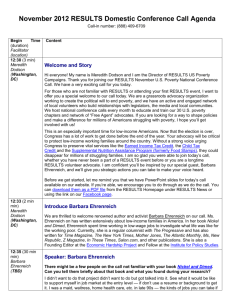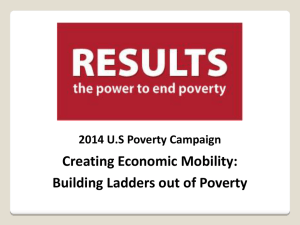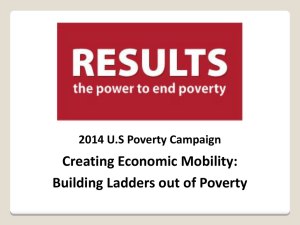Economic Opportunity Campaign PowerPoint Presentation
advertisement
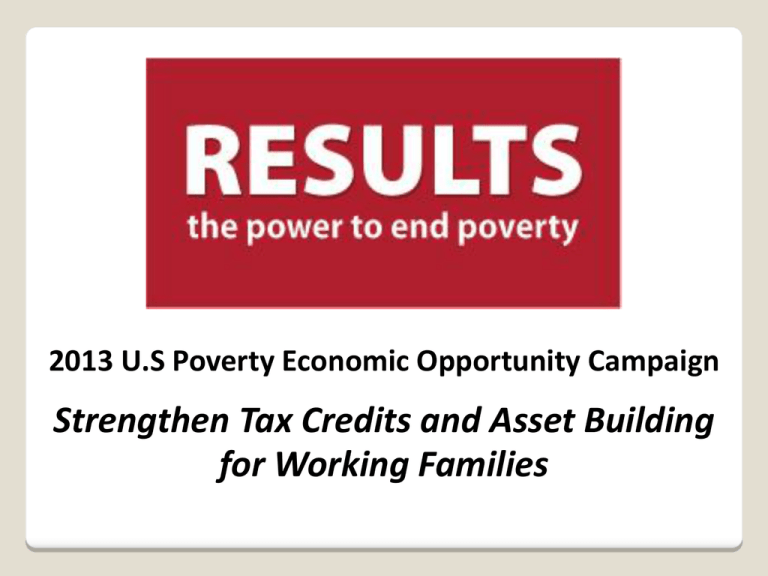
2013 U.S Poverty Economic Opportunity Campaign Strengthen Tax Credits and Asset Building for Working Families 2 Economic Opportunity for All Campaign Income Inequality in America 3 Economic Opportunity for All Campaign What is a Tax Expenditure? • Decreases government revenue. • Over half of tax expenditures go to the richest 20 percent of Americans. • Tax credits are the only category that favors low income households. 4 Economic Opportunity for All Campaign Earned Income Tax Credit • Designed to “make work pay” • Targeted to lowincome workers • Credit increases as the worker earns more money • Phases out as worker’s earned income grows • Amount of credit is determined by how many children are in the family 5 Economic Opportunity for All Campaign Why We Love the EITC • The EITC is the largest poverty reduction program in the U.S. • 27 million households claimed the EITC in 2012 totaling nearly $62 billion. • The EITC and CTC lifted 9.4 million Americans out of poverty in 2011. • The EITC also helps local economies – generates $1.50 - $2.00 for every $1 spent. 6 Economic Opportunity for All Campaign Child Tax Credit • Designed to offset expenses of raising children • $1,000 per child (under 17) • Must earn at least $3,000 to claim the credit • Partially refundable credit for low (not fully refundable like EITC ) • CTC is largest tax provision benefitting families with children. • Center on Budget and Policy Priorities estimates the CTC lifted 2.6 million people out of poverty in 2010. 7 Economic Opportunity for All Campaign What are the 2009 Improvements? In 2009, the American Recovery and Reinvestment Act made key improvements to the EITC EITC Reduced the “marriage penalty” by allowing married couple to earn more before phase-out begins Increased credit for families with 3 or more children CTC Reduced income eligibility threshold from $12,000 to $3,000 On average, these changes benefit 13 million households a year (2009-2011). That’s 25 million children! 8 Economic Opportunity for All Campaign How Important are the Expansions? • Changes to the CTC alone brought 900,000 people above the poverty line in 2011. • In 2011, the 2009 EITC expansions lifted 500,000 people above the poverty line and benefited 10 million people. • Combined, the EITC and CTC (including expansions) lowered the poverty rate by 2.8 percent and the childhood poverty rate by 6.3 percent. 9 Economic Opportunity for All Campaign Current Status • 2009 improvements were extended for 5 years (through 2017) in recent “fiscal cliff” deal (thanks to you!)… … but tax cuts for wealthy/middle class were made permanent • House and Senate tax leaders are working to enact comprehensive tax reform in 2013 or 2014 • Starting from a “blank slate” approach, meaning that tax expenditures will not be included unless they keep the tax code progressive, help the economy, or serve other important purpose • Senate tax leaders want input before July 26 10 Protecting Key Nutrition Programs 2013 EITC/CTC Request House and Senate: Talk to tax leaders and urge them to strengthen progressivity in the tax code and make the 2009 EITC and CTC permanent in tax reform. Senate: • Senate Finance Committee Chairman Max Baucus (DMont.) • Ranking Member Orrin Hatch (R-Utah) House: • Ways and Means Committee Chairman Dave Camp (R-MI-4) • Ranking Member Sander Levin (D-MI-9) 11 Economic Opportunity for All Campaign EITC and CTC Laser Talk Engage: The Earned Income Tax Credit (EITC) and Child Tax Credit (CTC) lifted 9.4 million people out of poverty in 2011. Problem: Despite the success of the EITC and CTC, important improvements to these credits will expire in 2017. These improvements alone lifted 1.5 million people out of poverty in 2011 12 Economic Opportunity for All Campaign EITC and CTC Laser Talk Inform: The EITC and CTC benefits millions of Americans, including hard working, full-time employees and 1.5 million current or former members of the military and their children. The EITC and CTC encourage work, and lift more children out of poverty than any other federal program. Let’s not cut supports that help working families who pay many different taxes and make such a difference. House and Senate tax leaders are working now on comprehensive tax reform – any tax reform must strengthen progressivity and protect the EITC and CTC. 13 Economic Opportunity for All Campaign EITC and CTC Laser Talk Senate Call to Action: Will you submit a letter to Senator Finance Committee Chairman Max Baucus and ranking Member Orrin Hatch, urging them to strengthen progressivity in the tax code by making the 2009 improvements to the EITC and CTC permanent? House Call to Action: Will you speak with House Ways and Means Committee Chairman Dave Camp (R-MI) and Sander Levin (D-MI) and urge them to strengthen progressivity in the tax code by making the 2009 EITC and CTC improvements permanent? Will you show your support for working families by cosponsoring the Child Tax Credit Permanency Act (H.R. 769) and the Earned Income Tax Credit Improvement and Simplification Act (H.R. 2116)? 14 Economic Opportunity for All Campaign Building Savings and Assets Why do savings and assets matter? • Improve Household Stability • Create an orientation toward the future. 71 percent of children born to high-saving, low-income parents move up from the bottom income quartile over a generation. • Enhance the welfare of children. Children with a savings account in their name are six times more likely to attend college than those without an account. 15 Economic Opportunity for All Campaign Wealth Inequality in America 16 Economic Opportunity for All Campaign The Financial Security Credit Designed to make saving easy, convenient, and worthwhile for low-income people • Opportunity: Tax time is generally when low-income taxpayers receive their • largest check of the year (from EITC and CTC) • Ease: Tax filer checks a box on tax return agreeing to depositing all part of refund into an eligible savings product (e.g. IRA, 401k, education account, Treasury bond) • Incentive: Low-income taxpayers would receive a dollar-fordollar match for their deposits, up to $500 per year. 17 Economic Opportunity for All Campaign FSC in Action: SaveUSA • SaveNYC started in 2008; expanded to SaveUSA in 2011 • Tax filers agree to deposit part of their tax refund into a savings account • If they held their initial deposit for at least one year, they received a match 18 Economic Opportunity for All Campaign Opportunity — The Bonus takes advantage of a time when people have extra cash they can save. Convenience — The Bonus allows people to sign up right on their tax returns without excessive time and paperwork. Incentive — Matching part of the deposits made by the taxpayer provides an strong motivation to begin saving. Building a Future — With a stable source of savings and assets, low-income households can begin to break the cycle of poverty and build a future for them and their children. 19 Economic Opportunity for All Campaign Other Asset Building Strategies Individual Development Accounts (IDAs) o Matched savings accounts (up to $500/yr) for education, retirement, home, etc. o Financial literacy classes. o 85,000 IDAs have been opened resulting in 9,400 new homeowners, 7,200 educational purchases, and 6,400 small business start-up and expansion purchases. Children’s Savings Accounts (CSAs) o Government funded savings account for all children at birth. Saver’s Credit o $1,000 tax credit for low-income households contributing to a retirement account. 20 Economic Opportunity for All Campaign 2013 Assets Request House and Senate: Urge tax leaders to expand policies that help low-income Americans save. In particular, urge them to include the Financial Security Credit in tax reform. Senate: • Senate Finance Committee Chairman, Max Baucus (D-Mont.) • Ranking Member, Orrin Hatch (R-Utah) House: • Ways and Means Committee Chairman, Dave Camp (R-MI-4) • Ranking Member, Sander Levin (D-MI-9) 21 Economic Opportunity for All Campaign Assets/FSC Laser Talk Engage: We know that savings are an important tool for lifting people out of poverty within their lifetime and into the next generation. 71 percent of children born to high-saving, lowincome parents move up from the bottom income quartile over a generation. Problem: Our tax code provides hundreds of billions per year in tax incentives to encourage building savings and assets, yet the bottom 60 percent of U.S. households only reap three percent of the benefits. Tax policy should help more Americans create wealth, not simply reward those who already have it. 22 Economic Opportunity for All Campaign Assets/FSC Laser Talk Inform/Illustrate: The Financial Security Credit can help correct this imbalance. It would allow low-income tax filers to deposit part of their tax refund into a savings account right on their tax return. And to encourage their participation, their deposits would be matched up to $500 per year. A similar pilot program called SaveUSA has shown that this kind of program can work. 23 Economic Opportunity for All Campaign Assets/FSC Laser Talk Senate Call to Action: Will you submit a letter to Senator Finance Committee Chairman Max Baucus and ranking Member Orrin Hatch, urging them to invest in policies that help low-income families save? In particular, will you talk to them about the Financial Security Credit and urge them to include it in any tax reform legislation? House Call to Action: Will you submit a letter to House Ways and Means Committee Chairman Dave Camp (R-MI) and Sander Levin (D-MI) and urge them to invest in policies that help low-income families save? In particular, will you talk to them about the Financial Security Credit and urge them to include it in any tax reform legislation? 24 Economic Opportunity for All Campaign Economic Opportunity Resources • RESULTS: www.results.org • New America Foundation’s Asset Building Project: www.assetbuilding.org • Corporation for Enterprise Development: www.cfed.org • Center on Budget and Policy Priorities: www.cbpp.org • National Community Tax Coalition: www.tax-coalition.org • Center for Tax Justice: www.ctj.org • Coalition on Human Needs: www.chn.org • Half In Ten: www.halfinten.org RESULTS/RESULTS Educational Fund 1730 Rhode Island Ave NW, Ste 400 Washington DC 20036 RESULTS Economic Opportunity Campaign Contacts: Meredith Dodson, dodson@results.org, (202) 782-7100, x116 Jos Linn, jlinn@results.org, (515) 288-3622 www.results.org
